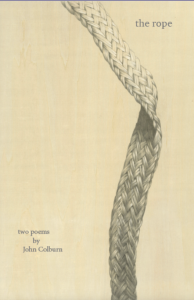BMR’s graduate reader, Emily Graves, reviews the rope: two poems by John Colburn.

John Colburn is the kind of soft-spoken activist poet, teacher and publisher who makes community seemingly effortlessly, quietly creating opportunity and advocating for the work of the people around him. He is a recognizable figure on the Minnesota writing scene precisely because he has made a life of seeking out, listening to and highlighting the voices of writers who might not have been heard otherwise—the young, the weird, the marginalized–helping teach, publish and give us a place in readings, spoken word events and performances over the last 30 years. Like so much of the Twin Cities writing community (of which I used to be a part) I have benefited from the connection with Colburn and the small press which he helped found, Spout Press, and John’s is work I always want to seek out and read. He’s the kind of poet that always reveals to us something of ourselves–often the part we’re most reluctant to see. Believe me, when I tell you: he does it because he cares.
Coburn’s latest book of poetry, the rope, chronicles the dystopia we’re living in now. Maybe you’ll want to read the two long poems that make up the book and skip on, get to the part where you don’t have to think. He’s not going to let you. In this collection of letters, messages and cries out to our future selves, Colburn documents for our descendants the ways we hurt each other–of what we did and to whom. In this place you wish were post-apocalyptic, but recognize all too well as our present world, food, touch, even death and the ability to be present for just a moment are codified transactions.
It’s easy to think Colburn is being cynical, but as the beats of these poems ring out, steadily reflecting back at us our time, our country, we can’t deny where he’s right: that even as we were “circulating recipes for marvelous pastries” we were incarcerating, caging, gunning down the most vulnerable among us. He lets our futures selves know: we allowed poisons to proliferate in the water and air, the temperature to rise while “souls fled the equator.” In the first long poem but they were capitalists, even the ghost-characters “who live in a lost dimension/without money/we will send them a bill.” And when almost everything–even beauty, water and light are up for sale–how alive are you?
John Colburn wants to know.
In the book’s second long poem inside the rope Colburn incriminates us all as he states the own recognition of his role in this time: “For a long time I did what was done to me…For awhile, I called it a blind spot.” As he beats a steady list into us of names, people, places who have suffered as a results of our collective crimes, he is reminiscent of other writers and declaimers–MLK, Woody Guthrie, Bob Dylan–the truth keepers, the speakers of our moral responsibility to remember those whom we’ve wronged. The steady repetition throughout the book, each poem housing 13-16 smaller poems, or numbered stanzas, implicates us all–in the cycle of forgetting, the cycle of systemic dehumanization, our participation in toxic patterns of capitalization and violence; our general lack of care for each other.
Is the rope completely without hope? No–Colburn pulls us back into acknowledgment of the possibility of healing and connection on what is recognizable as the poor, broken streets of Minneapolis, 2020. He writes us into at least the possibility of connection, as people dance, move, pray, try to make sound that is sacred together, even as on the other side of the rope, “police cars sat nearby lights spinning.”
He ultimately shows us that maybe we have a chance to expunge the hungry ghosts that roam restless alongside us, to instead find the ancestors–despite, or perhaps, even with, the presence of those forces that gain from our dissociation, disempowerment, debt and pain. He concedes to us a moment in time we might not call redemption, but that is, at its least, a community attempting, however fleeting, to move into wholeness.
Perhaps more books like Colburn’s the rope will show us how worth the effort it is to live more often settled into the present, in our bodies, with each other, without touching our phones or our wallets. Until the next call for help comes. And maybe that’s when and how we’ll have the presence to do what it takes to answer.
Bio: Emily Graves is a writer, teacher and healer. She lives in Santa Fe, New Mexico and is currently working on an M.F.A. in Fiction at the University of New Mexico, Albuquerque. Her single-authored book of poetry, Ballad of the Breathless, was published by Spout Press in 2008. She has also published poetry, essays and short fiction in several anthologies, magazines and small journals.